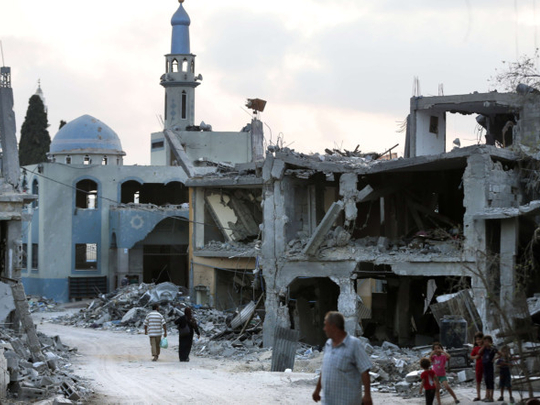
Gaza City: The owners of the largest factories in Gaza, whose operations were destroyed by artillery shells and air strikes, say Israel intentionally targeted the industrial sector to bring Gaza’s economy to its knees.
Hundreds of factories — including the producers of ice cream, paver tiles, soda pop and cardboard cartons — appear heavily damaged in a wave of destruction greater than the past two wars in Gaza combined.
At his food cannery, Ayman Hamada walked last week through the charred remains of his life’s work. He employed 150 workers and produced the most popular tomato paste in Gaza. The $5 million (Dh18.3 million) factory was still smouldering.
“I am positive, they hit our factories with intent, with a clear eye,” Hamada said. “The Israelis don’t make these kinds of mistakes.”
At his offices in downtown Gaza City, he fast-forwarded through hours of time-stamped video taken by his five security cameras.
“You see it is completely quiet. No fighters are inside my factory. No rockets are being launched. I make tomato sauce, not rockets. Now, wait for it, here,” he said as he slowed the recording down, to show bright explosions and then raging fire. His sister was killed in an Israeli air strike.
“I am a rich guy. Believe me, I have money, a nice house, a fancy car. Everything you could want. But I don’t care anymore. Kill me. Drop a bomb on my head.”
Leaders of the private sector in Gaza say they are squeezed between a hostile Egypt, militants in Hamas, and Israel, which enforces trade and travel restrictions and prohibits Gaza from operating an airport or seaport. Gaza has so few exports it is not worth counting.
The Gaza economy already was choking before Hamas began firing rockets. The top UN envoy in the Middle East, Robert Serry, said destruction here was three times greater than the 2009 war between Hamas and Gaza. The Gaza Chamber of Commerce warns that unemployment could soar to 50 per cent.
Much of the world’s attention has focused on civilian deaths, but factory owners say without work, Gaza will slip further into despair, which will bolster extremists.
“The economy was a target,” said Ali Al Haik, chair of the Palestinian Businessmen Association. “In the third week of the war the Israelis shifted fire to the industrial sector.”
Al Haik waved a list of 202 factories hit but said it was incomplete. He estimated the final number could double. He declined to share his list with a reporter.
“This was not an accident. This was a plan,” said Hatem Hassouna, manager for his family’s contracting and trade company.
“You could argue damage to a few factories is normal in a time of war. But look at the numbers. The strategic assets,” Hassouna said.
His family’s $6.5 million factory employed 230 workers and produced road pavers and ready mix cement. Hassouna said none of their cement was diverted to Hamas tunnels, which were constructed with materials smuggled into Gaza from Egypt, he said.
“We do not produce military items. Our owners do not support any political party. Our customers are UN organisations and projects approved by the Israelis,” Hassouna said.
The Hassouna factory was occupied by Israeli forces on the first day of the ground offensive. “We felt the factory was safe because they felt safe inside it,” he said.
In shock
When the cease fire was announced, they went to their facility. “We are in shock,” he said. “The destruction was complete. Not only tanks. They brought bulldozers to finish the job.”
Avi Segal, an authority in security studies at Ben-Gurion University in Israel, expressed surprise that a large number of factories were hit.
“The goal of the Israeli bombs is to cause pain, to bleed, so to speak. But the question is who. In my opinion it is possible this was meant to harm those people so that they would pressure Hamas,” Segal said.
Mohammad Al Telbani, owner of the largest industrial plant in Gaza, said his factory was hit by 40 shells over several days, until it was consumed by fire, when tonnes of butter, plastic and fuel ignited.
The Al Awda factory employed 450 workers and made ice cream, cookies and chips. He walked to the third floor and pointed to where Israeli shells entered one side and exited the other. The smell was enough to make him gag.
He denied that hostile fire came from his shop. “I never allow anyone near us. Not within a kilometre. My life is the factory. I live inside. I go to sleep at night listening to my production lines,” Al Telbani said. “There is no one like me in Gaza.”
“I was a symbolic target,” he said.
‘Trusted traveller’
Like prominent business people in Gaza, Al Telbani is a “trusted traveller” with permits to come and go through Israel and maintain close trading relations with Israeli counterparts.
Al Telbani denounced the recklessness of the war. He said Israel is wrong to believe that business owners could sway Hamas to change course, when the Arab League and Palestinian National Authority cannot.
“Ask the Israelis what Mohammad Al Telbani ever did to them,” he said. “You say there were rockets fired from my cookie factory?” He was shaking with anger. “Prove it.”












